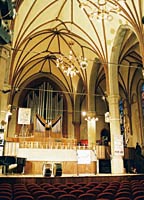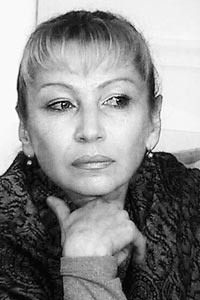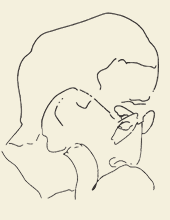Competition History
Russia's first international Competition of organists was held in September 1999 in the city of Kaliningrad. Selection of Kaliningrad as site of the Competititon was not incidental - this Russian enclave is convenient for European traveling and surrounded by organ tradition countries like Poland, Lithuania, the whole Baltic region. Opening up Russia for Europe and Europe for Russia is one of the objectives of this Competition.
 The unique place Mikael Tariverdiev's music occupies in Russia, its immense popularity and originality of what he has written for organ are the reason why the Competition is named after him. His artistic and social principles make the Competititon’s ideology.
The unique place Mikael Tariverdiev's music occupies in Russia, its immense popularity and originality of what he has written for organ are the reason why the Competition is named after him. His artistic and social principles make the Competititon’s ideology.
The Competition is held once in every two years in the Hall of Kaliningrad Philharmonic Society (former church, organ Reger Closs, 1982). It is planned to install a new big organ in the newly restored Cathedral of Kaliningrad where Immanuel Kant is buried. In this sense the logic of development of the Competition agrees with the logic of the city's life and development.
The First Competition was attended by musicians of 14 countries; Jury comprised of prominent musicians of Europe as well as of representatives of organ schools of Russia, Armenia and Georgia. Mr.Garry Grodberg, Jury's chairman and the first interpretator of such works of Mikael Tariverdiev as Organ concerto Cassandra and Organ symphony Chernobyl, Ms.Natalia Gureyeva, Professor of Moscow Conservatoire, Mr.Vaagn Stamboltsian, Professor of Yerevan Conservatoire, M.Michele Shapui of France, Professor Jean Volfs of the Netherlands, Professor Camil Doogh of Belgium, Professor Piter Graiter of Poland sat on the Jury.
Some of the comments of Jury members:
Winners of the Competition had concert tours in many cities both Russian, and European. Several times there were joint performances of the Second and Third Competitions' winners. Prominent among them were concerts in Moscow Conservatoire's Maly Hall, in the Presidential concert hall of Kazan (organized by Triumph Charity Foundation), in St. Eustache Cathedral of Paris organized within the framework of Organ's Prestige Festival under the patronage of Maestro Jean Guillou.
Maestro Jean Guillou:
I would like to express the great joy derived by me from the Russian program presented by Ekaterina Melnikova and Lada Labzina, the two winners of Mikael Tariverdiev International Organ Competition. They were the embellishment of the Festival's program, their rendering was superb, vivid, each of them in her own manner demonstrating the music and the potential of the organ of St. Eustache Cathedral where I am working for many years.
Mikael Tariverdiev International Organ Competition offers young musicians a chance to express and assert themselves. I hope that the French public will have many more chances to hear the wonderful Russian organists. As for the Competition - I wish it success and strengthening the lofty principles from the very start declared by its organizers.
The Third Competition follows the same principles of forming the program. Mikael Tariverdiev pieces are included in all three rounds along with traditional organ repertory. Obligatory for the third tour are pieces by the outstanding organist Mr. Naji Hakim who participated in shaping the program of the Third Competition and assisted the Organizing Committee in preparing the event. Muzyka Publishers brought out in time for the Competition a collection of Mikael Tariverdiev organ works - everything the composer wrote for this instrument. The Organizing Committee is planning jointly with Moscow Conservatoire to launch a contest for the best piece of organ music which would be made a part of the Competition's obligatory program.
 VERA TARIVERDIEVA,
VERA TARIVERDIEVA,
Mikael Tariverdiev charity foundation, President, Art-director of the competition
BRIEF STORY OF GREAT HISTORY
Iam often asked of the reason why I have chosen Kaliningrad as the venue for the Competition. I could list a number of reasons. But actually it was not a reason but rather an impulse that prompted me. It happened on my very first day or, to be precise, the first night that I ever spent in Kaliningrad. I went to see the Cathedral of KQnigsberg. There was not a soul around. Huge blocks of ice crowding around Cathedral that dark shape of Cathedral is welcoming me. From this moment I never doubted that Kaliningrad is the right place for the only Russian international organ competition.
It was six years ago and now we are getting ready for the fourth Competition. What the future has in store for the Competition — I don’t know. Yet I am convinced that the six years that passed are now a part of Kaliningrad’s history and the Competition’s destiny is inseparable from the destiny of this city.
Each and every time the Competition drew together wonderful musicians whose presence and active involvement made I such a successful event. The city also contributed to the success. I remember how on the next day after the First Competition closed I heard people in the street discussing organ, surprised that this instrument is played by hands and feet.
Kaliningrad TV was telecasting live the opening and closing ceremonies of the Competition and people who never visited a concert hall came to appreciate the Competition and organ music. The city chose for his hero Michel Shapuis that legendary French organist, a great connoisseur of trams and gave him a chance to ride its streets in a personal tram.
I could tell so many other stories of human and professional encounters. But what I mean to stress is that it is the city which became the principal participant of the Competition. They matched — the City and the Competition. And still another thing. The City gave a new dimension to Mikael Tariverdiev’s fame. Sure, the whole country knew and loved his film music, but it was Kaliningrad that began to open up for Russia a different Mikael Tariverdiev. It was Kaliningrad that gave a new lease of life to his music. The Competition has an aspect which is very important, probably, it is the most important aspect. The Competition is a search for like-minded people. The kind that share one’s views and are prepared to share one’s destiny. The Competition winners proved to be such people. Today they might be called Kaliningradians. Kaliningrad became a landmark of their professional careers, the city gave them a chance to understand and appreciate the ambiance of love and human nearness. So wherever they perform, be it Paris or London, Amsterdam or Riga, Krasnoyarsk or Kazan they proudly announce in the posters their belonging to the most westerly city of the Russian Federation. It is nit incidental that when they all assembled in Moscow International House of Music to take part in the Organ Hit-Parade program, they dedicated this recital to the Jubilee of Kaliningrad. I am happy that in the framework of the Fourth Competition we celebrate the jubilee of this Russian city both in Moscow and Hamburg where the first round is to be conducted.
I am happy that Kaliningrad is recollected with love by outstanding musicians who were its guests: Jean Guillow, Martin Haselboek, Naji Hakim, Cerolle Terry, Lionel Rogg, Leonid Desiatnikov, Talivaldis Deksnis...
I am happy that Gidon Kremer who along with his Kremerata Baltica group was opening the Third Competition returns to this city in order to open the Fourth one.
Once when Mikael Tariverdiev and me were vacationing in Yalta a funny thing happened: someone has started a rumor that a white boat named Mikael Tariverdiev has just docked in Yalta harbor and whoever wishes to go on a sea-trip should register his name. The joke was a huge success — it was immediately believed by everybody. We tried to dissuade the people but they insisted that we should go and take a look at the beautiful white boat waiting for passengers...
This year a white MS EUROPA is to call at the harbor of Baltiysk. The passengers will land, pay their tribute to the city and attend the opening concert of the Fourth Competition. Perhaps this is not incidental either. Mikael Tariverdiev was in love with music and sea, with sea sports, with yachts and boats. Perhaps one day a white boat would dock in port of Kaliningrad. It would bear the name that is already born by the International Competition of Organists — MIKAEL TARIVERDIEV. Because now we share the destiny.
I don’t know when EUROPA would have docked in Baltiysk harbour is Knud Knudsen would not have entered the story of the Competition. His name was fist mentioned by Martin Hazelboek who attested him as an extraordinary person, an ardent lover of music helping the young talent, always ready to get involved in an off-beat project. I thought that this Knud Knudsen should be find our Competition interesting. Thanks to Martin Hazelboeck. We started corresponding and two months after the Third competition I flew to Hamburg where I was to be met be Knud Knudsen at the airport. A tall, handsome, dashing man. I never saw him before but recognized at once. And we made friends at once. It was then and there that we decided to make the Russian competition a presence in Germany.
Knud made a successful career as a lawyer but the last sixteen years of his life were dedicated to music. It was Knud who made regulations of the International Organists Contest in Calgary that placed this project among the most important organ event of the recent decades.
Knud for a number of years collaborated with Happag Lloyd; it was actually his idea to restore the traditional ties of the two Hansaean Cities: Hamburg and Kaliningrad. Not on the level of governments or official delegations but rather among common — as well as not so common — people. He felt that music is the best means for it. Knud used to organize concerts for Happag Lloyds cruises, so he wanted EUROPA, the best of the company’s boats to call in the harbour of Baltiysk in the year of Kaliningrad’s 750th anniversary. He never visited Russia before, despite having close connections with many Russian musicians. When Zakhar Bron moved to live in Germany, for a while he stayed with Knud in Luebeck. Knud helped his students, as he helped many other young Russian musicians, and not only Russian.
I am happy that Knud twice visited Moscow and Kaliningrad on the invitation of our Organizing Committee, I am happy that he liked it here and felt at home among us. He was really taken by this idea — to conduct Mikael Tariverdiev Fourth International Organ Competition in three cities. I am sorry that this was to be the last project of his life. I am sorry, he would not see the white boat entering the harbour of Baltiysk.
But he was a dreamer. And he has dreamt of it which means he saw it.




Prof.Michel Shapuis:
Works of Mikael Tariverdiev filled with melodic and harmonic sensuality became for us real and principal discoveries of the Competition.
Prof. Jean Wolfs:
In my opinion Tariverdiev Contest must grow into one of the most important competitions of Europe.
Mr.Garry Grodberg:
International Competititon of organists is a long overdue and much needed idea. Russia certainly cannot boast of as many organs as Europe but it has its own traditions of organ performance which is a part of the great performing school of Russia. Organ concerts are very popular in this country. We hope that Tariverdiev Competition would contribute to further popularization of this instrument and would provide Russia with opportunity to make the word more aware of our talent and achievements.